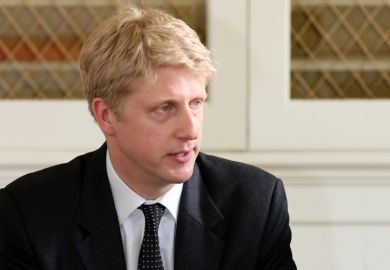Jo Johnson's speech at the Reform thinktank attempts to draw a hard line under post election debates about the "value" of the English higher education system.
You can read an edited version of the speech on the Department for Education website: but it is edited. Heavily. It doesn't capture the vitriol that Johnson poured on Jeremy Corbyn's pledge to abolish tuition fees at the general election, and his apparent retreat from "dealing" with the debts of existing students. It's not often that NME, Reservoir Dogs and "Bait and Switch" get mentioned in a speech about higher education – and according to the DfE version they didn't yesterday.
I hope there's a bootleg version doing the rounds.
As for Bait and Switch, I'll admit that I'd not heard of them before. But they do sound a bit dodgy. Apparently it's the action (generally illegal) of advertising goods which are an apparent bargain, with the intention of substituting inferior or more expensive items. So, to counter the Corbyn "surge" and what Matthew Taylor of the RSA described as the "growing reputational crisis" for universities, Johnson is calling in more reliance on competition and markets.
He's putting his foot firmly on the gas. During the "wash up" of the HE Bill, the government promised a review of the Teaching Excellence Framework, but yesterday's announcements suggest that there's little point. As Johnson said: "The time is right to build on these results."
It's going to go faster and deeper. Subject level assessments and medals, new metrics on teaching "intensity", more data on employment and earnings via LEO, compulsory participation as a mechanism through which the Office for Students might tackle vice-chancellor pay.
His defence of all of his reforms and most of those of his immediate predecessors was certainly robust. Amidst the lengthy, Reservoir Dogs-inspired attacks on Corbyn - "we've all seen the film and we know how it ends" - he also defended falls in part-time student numbers (we'll deal with it), and nursing applications (there'll be more places and more nurses).
He argued passionately in support of government writing off a third of student debt as "a conscious investment in the skills base of the country, not a symptom of a broken student finance system". Although barely a sentence later he complained that "too many, perhaps a fifth to a third of students, end up with non-graduate jobs" and that they should expect to "secure good labour market outcomes that justify their investment of time and money".
These don't yet feel like arguments that run together. A conscious investment in the productive skills base of the country must surely be the same thing as securing good labour market outcomes for graduates?
Squaring all of that will fall to the TEF and to the new OfS - with the establishment of the latter brought forward by three months to 1 January 2018.
They mark a significant ramping up of the market - even since the Higher Education Act - and they bring a host of new interventions in it. Barely formed, this market and its new regulator are now tasked with many more detailed interventions. In most market theory that also means more complexity and cost.
When Johnson first announced the TEF he promised that it would not be "big, bossy or bureaucratic". That now feels a long time ago.
But all of this was promised in the Conservative manifesto so it's not as though we weren't warned. But it's more the 2015 manifesto that he helped to write and not the 2017 version that he didn't.
Today's unease about the system introduced by David Willetts and Vince Cable in 2010/11 have been party triggered by the changes applied after 2015. The £2 billion of savings offered by the then BIS Secretary of State, Sajid Javid, in a spending review dominated by deficit reduction included the freezing of the £21,000 repayment threshold and the scrapping of remaining grants and nursing bursaries. They remain a problem.
But the more recent Conservative manifesto offers rather different interventions in the higher education "market". An industrial strategy. A "major review of tertiary funding". New Institutes of Technology in "every major city" and backed by "leading universities" and "the best programme of learning and training for people in work and returning to work in the developed world".
But there was no mention of any of these in Johnson's speech yesterday.
That should change soon because the other half of his job is to deliver them as the new ministerial lead on Industrial Strategy at BEIS. Ultimately it's the other half of universities' job too. As prime minister Theresa May promised in both the manifesto and the Industrial Strategy green paper, that's a "stronger economy that works for everyone – where wealth and opportunity are spread across every community in the United Kingdom, not just the most prosperous places in London and the South East".
How we bring these roles together and reconcile an accelerating HE market with national and regional growth is perhaps the biggest value for money question of all.
It may be unfair though to judge the speech on what wasn't said. So in what Jo Johnson did say, was there enough to head off growing criticism of our universities and the tuition fee and student finance system that helps to pay for them? I'm not convinced.
Firstly because it's a fine print response to an argument that is being conducted in much broader brush headlines and soundbites. Interventions in the "terms and conditions" - detailed as they are - may change the day to day working of the system and the relationship between students and universities but it's hard to see the Corbyn masses (and their parents) getting quite as excited about them. Nor does it obviously win over those critics of universities who are also revelling in the backlash. The "more means worse" crowds on the left and right aren't going away.
As a key part of this reaction, journalists attending the speech were probably most interested in Jo Johnson's proposals to tackle VC pay. It was certainly well trailed beforehand.
His arguments were familiar - that "universities must justify the exceptional circumstances for pay awards that exceed the pay of the Prime Minister". He even offered a solution of benchmarking performance through the TEF as "a potential indicator that remuneration committees might consider before approving high pay awards". Ultimately, like much else on offer in his speech, he left the detailed actions and interventions to the Office for Students.
Or as Mr Blonde put it in Reservoir Dogs: "Are you gonna bark all day little doggie, or are you gonna bite?"
Andy Westwood is professor of further and higher education at the University of Wolverhampton and co-director of Policy@Manchester at the University of Manchester.
Register to continue
Why register?
- Registration is free and only takes a moment
- Once registered, you can read 3 articles a month
- Sign up for our newsletter
Subscribe
Or subscribe for unlimited access to:
- Unlimited access to news, views, insights & reviews
- Digital editions
- Digital access to THE’s university and college rankings analysis
Already registered or a current subscriber? Login






